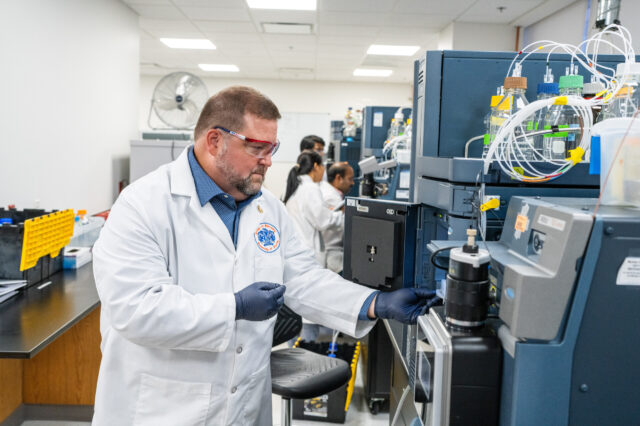UF Health researchers to develop novel treatment for stimulant use disorder

University of Florida Health researchers have secured a five-year, $19 million grant to develop a novel treatment for stimulant use disorder. The oral therapy drug could become the first medication available to treat stimulant use disorders that include cocaine, methamphetamine and prescription stimulants.
The National Institutes of Health and the National Institute on Drug Abuse awarded the grant to advance the molecule SBS-518 into a human clinical trials through their Helping to End Addiction Long-term, or HEAL, program. The compound was developed in the lab of Chris McCurdy, Ph.D., a professor of medicinal chemistry and the Frank A. Duckworth Eminent Scholar Chair in the UF College of Pharmacy.
Preliminary studies have shown SBS-518 to be among the first compounds to successfully target sigma proteins and the dopamine transporter — key components of the brain that regulate how stimulants affect the body. In animal studies, the compound blocks stimulant-induced rise in dopamine in the brain as well as the surge in dopamine that occurs with self-administration of cocaine and methamphetamine.
The dopamine transporter has long been an elusive target for researchers looking for new ways to treat substance abuse. McCurdy said national funding agencies made significant investments to identify new molecules that would block cocaine and other stimulants from binding to target sites in the body where drugs take effect, but these efforts were largely ineffective and failed to produce any FDA-approved treatments. The emergence of SBS-518 provides strong early evidence that an effective medication is possible.
“There is no FDA-approved treatment available for stimulant use disorders,” McCurdy said. “It’s an unmet medical need in this country and across the globe. With this grant, we are taking the first step in developing an eventual arsenal of drugs that could reduce stimulant use disorders.”
The annual National Survey on Drug Use and Health found that in 2021, some 4.5 million Americans 12 and older had a stimulant use disorder of cocaine, methamphetamine or prescription stimulants.
In the first two years of the study, McCurdy’s lab will work to convert the compound into a clinical oral drug candidate. The final three years will involve toxicity studies and preparing the drug for a clinical trial. McCurdy directs UF’s Translational Drug Development Core, which is located in the Clinical and Translational Science Institute. The core will work to take the compound from the lab to clinical studies.
“It’s promising research because we are examining a new set of molecular targets that have not been explored before in detail,” McCurdy said. “If we can develop an oral therapy that blocks the effects of stimulants like cocaine and methamphetamine, then we have a real opportunity to improve the quality of life for those seeking treatment for these use disorders.”
Sparian Biosciences, a clinical-stage biopharmaceutical company based in New York, will assist as an industry partner for the research. UF College of Pharmacy researchers Jay McLaughlin, Ph.D., a professor of pharmacodynamics; Brandon Warren, Ph.D., M.S., an assistant professor of pharmacodynamics; and Abhisheak Sharma, Ph.D., M.Pharm., an assistant professor of pharmaceutics, are co-investigators of the study.
About the author
